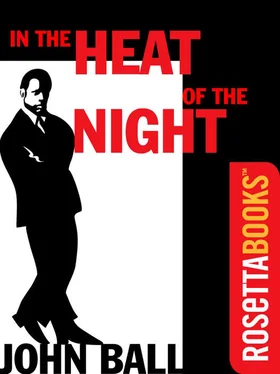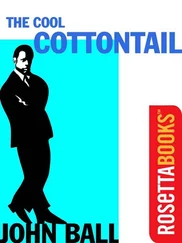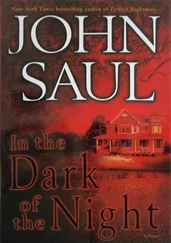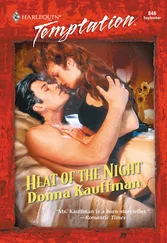John Ball - In the Heat of the Night
Здесь есть возможность читать онлайн «John Ball - In the Heat of the Night» весь текст электронной книги совершенно бесплатно (целиком полную версию без сокращений). В некоторых случаях можно слушать аудио, скачать через торрент в формате fb2 и присутствует краткое содержание. Год выпуска: 2010, ISBN: 2010, Издательство: RosettaBooks, Жанр: Полицейский детектив, на английском языке. Описание произведения, (предисловие) а так же отзывы посетителей доступны на портале библиотеки ЛибКат.
- Название:In the Heat of the Night
- Автор:
- Издательство:RosettaBooks
- Жанр:
- Год:2010
- ISBN:0786708832
- Рейтинг книги:4 / 5. Голосов: 1
-
Избранное:Добавить в избранное
- Отзывы:
-
Ваша оценка:
- 80
- 1
- 2
- 3
- 4
- 5
In the Heat of the Night: краткое содержание, описание и аннотация
Предлагаем к чтению аннотацию, описание, краткое содержание или предисловие (зависит от того, что написал сам автор книги «In the Heat of the Night»). Если вы не нашли необходимую информацию о книге — напишите в комментариях, мы постараемся отыскать её.
In the Heat of the Night — читать онлайн бесплатно полную книгу (весь текст) целиком
Ниже представлен текст книги, разбитый по страницам. Система сохранения места последней прочитанной страницы, позволяет с удобством читать онлайн бесплатно книгу «In the Heat of the Night», без необходимости каждый раз заново искать на чём Вы остановились. Поставьте закладку, и сможете в любой момент перейти на страницу, на которой закончили чтение.
Интервал:
Закладка:
“Chief, I hate to wake you, but if Sam Wood is right, we may have a first-class murder on our hands.”
Gillespie forced himself to sit up and swing his legs over the side of the bed. “Tourist?”
“No, not exactly. Sam has tentatively identified the body as that of Enrico Mantoli-you know, the fellow who was going to set up a music festival here. Understand, Chief, that we aren’t even sure yet that the man is dead, but if he is, and if Sam’s identification is correct, then somebody has knocked off our local celebrity and our whole music-festival deal probably has gone to pot.”
Bill Gillespie was fully awake now. While he felt automatically for his slippers with his feet, he knew that he was expected to take command. The schooling in his profession he had had back in Texas told him what to say. “All right, listen to me. I’ll come right down. Get a doctor and the ambulance there right away, a photographer, and dig up a couple more men. Have Wood stay where he is until I get there. You know the routine?”
The night desk man, who never before had had to deal with a murder, answered that he did. As soon as he hung up, Gillespie rose to his full six feet four and began quickly to climb into his clothes, running over in his mind exactly what he would do when he reached the murder scene. He had been chief of police and a Wells resident for only nine weeks, and now he would have to prove himself. As he bent to tie his shoes, he knew that he could trust himself to do the right thing, but he still wished that the hurdles immediately before him had already been cleared.
Despite the fact that he was only thirty-two, Bill Gillespie had abundant confidence in his own ability to meet whatever challenges were thrown at him. His size made it possible for him to look down literally on most men. His forcefulness, which had cost him the girl he had wanted to marry, swept away many normal obstacles as though they had never existed. If he had a murder on his hands he would solve it, and no one would dare to question him while he was in the process.
Then he remembered that he had not been told where the murder was. He picked up the phone angrily and misdialed in his haste. He slammed the instrument back into its cradle before what he knew would be a wrong number could ring, and then, forcing himself to be calm, tried again.
The night police desk man, who had been expecting the call, answered immediately. “Where is it?” Gillespie demanded.
“On the highway, Chief, just below Piney. The ambulance is there and the doctor has pronounced the victim dead. No positive identification yet.”
“All right,” the chief acknowledged, and dropped the instrument into position. He didn’t like having to admit that he had had to call back to know where to go. He should have been told the body’s position the first time.
Bill Gillespie’s personal car was equipped with a siren, red lights in the rear window, and a police radio set. He jumped in, kicked the starter, and jerked the car away from the curb and up to speed without any regard whatever for the cold engine. In less than five minutes he saw ahead of him the police car, the ambulance, and a little knot of people gathered in the middle of the highway. Gillespie drove up quickly, set the brake, and was out of the car before it had come to a complete stop.
Without speaking to anyone, he strode rapidly to where the body still lay in the street, then squatted down and began to run his hands quickly over the fallen man. “Where’s his wallet?” he demanded.
Sam Wood stepped forward to reply. “It’s missing. At least I didn’t find it on the body.”
“Any positive identification?” Gillespie snapped.
The young doctor who had come with the ambulance answered that. “It’s Enrico Mantoli, the conductor. He was the spark plug behind the musical festival we’ve been planning here.”
“I know that,” Gillespie retorted curtly, and turned his attention again to the body. He had a strong desire to tell it to sit up, wipe the dirt off its face, and tell him what happened, who did it. But this was one man whom he could not command. All right then, it would have to be done some other way. Gillespie looked up.
“Sam, take your car, check the railroad station and the north end of town to see if anyone is crazy enough to try to hitchhike out of here. Wait a minute.” He turned his head quickly toward the doctor. “How long has this man been dead?”
“Less than an hour, I should say, possibly less than forty-five minutes. Whoever did it can’t be too far away.”
Gillespie allowed an expression of angry annoyance to cross his face. “All I asked you was how long he has been dead; you don’t have to tell me my job, I’ll tell you. I want photographs of the body from all angles, including some shots long enough to show its positionrelative to thecurb and thebuildings on thewest side of thestreet. Then mark the positionin chalk outline and barricade thearea to keep traffic off this spot. After thatyou can take thebody away.” He stood up and saw Sam standing quietly by. “Whatdid I tell you to do?” he demanded.
“You told me to wait a minute,” Sam answered evenly.
“All right then, you can get going. Hop to it.”
Sam moved quickly to his patrol car, and drove away with enough speed to avoid any possible criticism later. As he headed toward the railroad station, for a brief moment he allowed himself to hope that Gillespie would somehow make a public fool of himself and bungle the case. Then he realized that such a thought was totally unworthy of a sworn peace officer and he resolved that no matter what happened, his part would be done promptly and well.
At the last moment, as he approached the silent railroad station, he slowed his car down to avoid giving any undue warning to a possible murderer lurking inside. Sam pulled up close to the wooden platform and climbed out without hesitation. The station was a small one which dated back at least fifty years; at night it was inadequately lighted by a few dusty bulbs which seemed as ageless as the worn hard benches or the unyielding tile floor. As Sam walked rapidly toward the main waiting-room door, he had a sudden desire to loosen the pressure of his uniform cap. He rejected the idea at once and entered the station every inch a police officer, his right hand on his gun. The waiting room was deserted.
Sam sniffed the air rapidly and detected nothing to suggest that anyone had been there recently. No fresh cigarette smoke, only the habitual aroma of all such railroad stations, the evidence of thousands of nameless people who had passed through and gone on.
The ticket window was closed; the glass panel was down. Posted inside was a square of cardboard with the arrival times of the night trains printed in heavy crayon. Sam looked carefully about the room once more while he thought. If the murderer was here, he probably did not have a gun. He had killed by hitting the dead man on the back of the head with a blunt instrument, and with a blunt instrument Sam was confident he could deal. He bent and checked the small area under the benches. It was clear except for dirt and a few bits of paper.
Striding through the room, Sam pushed open the door to the train platform and looked both ways. The platform, too, was deserted. Walking with firm, authoritative steps, Sam passed the locked baggage-room door, which he tested and found secure, and paused by the dingier door over which a white board sign specified COLORED. With his right hand once more on his sidearm, Sam pushed into the poorly lighted room and then drew a quick gulp of breath. There was someone there.
Читать дальшеИнтервал:
Закладка:
Похожие книги на «In the Heat of the Night»
Представляем Вашему вниманию похожие книги на «In the Heat of the Night» списком для выбора. Мы отобрали схожую по названию и смыслу литературу в надежде предоставить читателям больше вариантов отыскать новые, интересные, ещё непрочитанные произведения.
Обсуждение, отзывы о книге «In the Heat of the Night» и просто собственные мнения читателей. Оставьте ваши комментарии, напишите, что Вы думаете о произведении, его смысле или главных героях. Укажите что конкретно понравилось, а что нет, и почему Вы так считаете.












